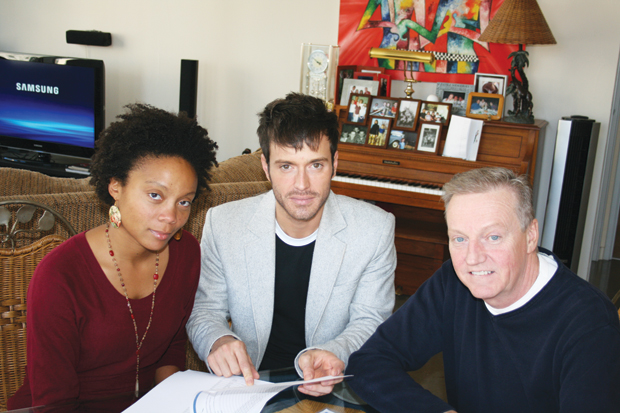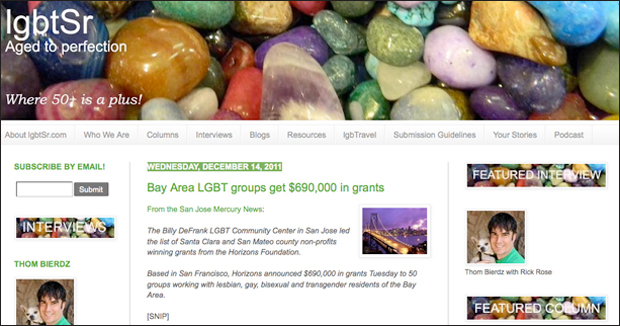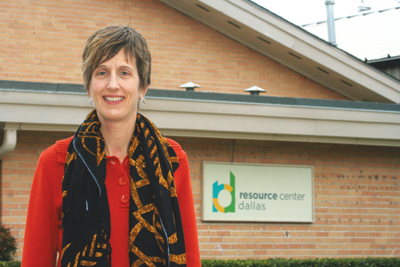Cannon Flowers has teamed up with Resource Center Dallas on a project to gauge and meet the needs of LGBT seniors

BRIDGING THE GENERATION GAP | Cannon Flowers, right, is getting help with his Mature LGBT Project for North Texas from Candace Thompson and Beau Bumpas, two 31-year-olds who share an interest in creating resources for LGBT seniors. (David Webb/Dallas Voice)
David Webb | Contributing Writer
davidwaynewebb@yahoo.com
It was an irony of life that caused community activist Cannon Flowers to develop an even more compelling concern for the challenges some LGBT people face as they grow older and struggle to maintain basic living standards.
Flowers had already drafted his proposal for the “Mature LGBT Project for North Texas” for presentation to an audience of community leaders when he slipped on a rainy sidewalk while walking his dog in early November and broke his leg. The accident put Flowers in the hospital, and his injury required surgery that left him recovering in a wheelchair.
The activist, who has supported a number of LGBT community causes over the past 10 years, suddenly became unable to properly care for himself, putting him in a similar position as the targeted group his project would benefit.
“I don’t think I could have made it without help,” said Flowers, who fortunately had a partner and several close friends upon whom he could rely for help until he recovered. “I think there would have been days I would have had to go without eating if I hadn’t had anyone to help me.”
Flowers, 53, said the experience gave him a new appreciation for the hardships LGBT seniors sometimes experience. And it strengthened his resolve to help provide more community resources for them.
The plight of disadvantaged LGBT seniors had already been highlighted a year earlier by the discovery that an elderly gay political activist suffering from dementia had wound up living on the streets of Dallas before he was arrested by police and later placed in a nursing home.
“I’ve been thinking about it for the last couple of years,” said Flowers, who noted that his concerns about some older friends’ isolation had sparked the idea. “I see them, and I realize they shouldn’t be alone. It doesn’t have to be a holiday. They just shouldn’t be alone.”
The project’s proposal includes statistical information derived from the 2010 U.S. Census that estimates there are 30,000 LGBT people between the ages of 45-90 living in Dallas County. The data also indicates that 27 percent of all people 65 and older live alone.
Flowers’ proposal identifies numerous unique challenges faced by older members of the LGBT, including loneliness caused by the loss of life partners and the absence of children and other family members in their lives. It also points to financial and legal problems caused by the lack of protection through traditional marriage rights and a lack of social services and living facilities specifically geared to the LGBT population.
The proposal notes that although there are programs and living facilities for the general population that LGBT seniors can access, there often are barriers created by real or perceived anti-gay discrimination. LGBT seniors fear they would be forced to go back into the closet in order to access resources devoted to the general population, according to the proposal.
In announcing a national summit recently, the U.S. Department of Housing and Urban Development acknowledged that LGBT seniors face additional stresses because they are more likely to age without the benefit of a partner, children and other family support. And Services and Advocacy for GLBT
Elders and the National Academy on an Aging Society released their “Public Policy & Aging Report” that shows LGBT seniors face significant barriers to successful aging that include poor health outcomes, a lack of economic security, social isolation and unequal treatment under the law and in general population aging programs.
Those national reports show the needs of LGBT seniors are easily understood and documented, but they aren’t being fully addressed at this time in Dallas, Flowers said.
“There’s just not any organization spearheading it,” Flowers said. “In the last two years I’ve talked about it a lot, and I’ve thought somebody has got to do something about it.”
The overall project proposed by Flowers appears to be far-reaching and ambitious, providing for services that would include social networking and consultation and education services for diet, medical needs, legal services, life coaching, finances, grief support, retirement living and travel.
The preliminary results from a survey Flowers sent out to LGBT people in Dallas showed the primary areas of interest were LGBT-dedicated living facilities, programs for promoting lifelong friends and programs sponsoring social events.
Flowers has been in contact with Resource Center Dallas officials on his project, and he is collaborating with them as a volunteer in an effort to get the project launched.
Cece Cox, executive director and chief executive officer for Resource Center Dallas, said she agrees there is much work to be done to meet the needs of LGBT seniors, and said center officials welcome the work Flowers is doing.
“I think it is important work,” Cox said. “I’m supportive of it.”
Cox said that Flowers is helping the center staff develop and implement an assessment tool that can be used to gauge the suitability of general-population facilities and programs for LGBT seniors.
It would be beneficial if the other components of Flowers’ project could be coordinated with the center, which is already addressing some needs of LGBT seniors, Cox said.
The center administers a program called GAIN — the LGBT Aging Interests Network — that provides learning, entertainment and social activities and referrals for LGBT seniors.
The survey Flowers sent out also shows that a majority of people would prefer an existing agency like Resource Center Dallas undertake
the project rather than creating an independent agency dedicated to LGBT seniors.
The center is in the process of developing a strategic plan for expanding its services for LGBT seniors, Cox said. Center staff recently provided cultural competency training to the senior ombudsman for the Texas Department of Aging, and similar training is planned for other professionals who deal with seniors as the needs are identified, she said.
Flowers’ work helping center staff survey and assess senior facilities and programs will assist in the improvement of referral services for LGBT seniors, Cox said. Other alliances with organizations serving general populations will likely be announced in 2012, she said.
“There is a lot happening,” said Cox, who noted the Women’s Communities Association has been collecting undergarments and socks for nursing home residents for years.
Interest in and work on LGBT senior issues has been steadily building momentum for at least the past five years, Cox said. The work has begun to attract more attention because of more data being produced about it, she said.
Also, more attention is being paid to LGBT seniors because there are more openly LGBT seniors than ever before, Cox said.
“We focus on what is important to us,” Cox said. “We are aging so that has become more important to us.”
In relation to other big U.S. cities’ progress in the area of LGBT senior services, Cox said Dallas is behind some cities and ahead of others.
Cox said it is unlikely a living facility for LGBT seniors would be built in Dallas because of the expense and the difficulty that would be encountered in obtaining funding for it.
Perhaps one way to compensate for the lack of a dedicated living facility is to ensure that LGBT seniors receive interaction with other like-minded people.
One of the major components of Flowers’ project would pair needy LGBT seniors with young people who would volunteer to visit with and assist them.
“I really do believe there is a value to having young people in your life,” said Flowers, whose friends include younger people with whom he became acquainted through his adult children. “It forces you to stay young that much longer.”
Flowers has already recruited two younger people to his project who are willing to volunteer their time to interact with LGBT seniors and to help Flowers attract more youthful volunteers. Candace Thompson, a social worker, and Beau Bumpas, a photographer, both 31, said they are eager to help Flowers kick off the project.
Thompson said she is the primary caregiver for her 90-year-old grandfather so she is already involved in the type of assistance that is needed. Flowers said she will be helping him develop guidelines for the volunteer work.
“I’ve always gravitated toward older people,” Thompson said. “Aging is a reality. It will happen at one point in time, so everyone needs to be prepared for it.”
Bumpas said that in addition to helping Flowers who has been his mentor, he also wants to see the project implemented for personal reasons — even though he is still relatively young.
“I’m single, and I don’t see myself getting a partner,” Bumpas said. “It scares me to wonder who is going to take care of me when I get old. I’m all alone.”
Flowers said that Thompson and Bumpas would be providing invaluable assistance to him as he figures out how to market his project to the community at large to gain volunteers and to gather support for funding it. For the project to work, there must draw support from all ages of LGBT people, as there has been for programs helping LGBT youth, he said.
Flowers said LGBT youth programs have been successful because LGBT adults remember what it was like to be young and gay. The challenge will be to create an “emotional aspect” that helps younger LGBT people imagine what it would be like to be old and gay and in need.
……………………..
NEWS YOU CAN USE

THE LGBTSR WEBSITE | The LGBTSR website, launched in May, focuses on news and advice for and about LGBTs over 50.
LGBT publications are often geared toward a youth-appreciative audience, but at least one Web site wants to attract a different type of reader.
LGBTSR.com, which was launched in March of this year, is tailored to attract LGBT readers who are 50-plus years of age. The website “embraces age and celebrates life over 50, with all the ups and downs of living long enough to tell about it,” according to the Website’s mission statement, which promises to provide readers with news, reviews, opinion pieces and a “thing or two to hold up to the light.”
Mark McNease, 53, of New York City, is the founder of LGBTSR.com. He lives in Manhattan with his partner Frank of five years, whom he plans to soon marry under the state’s new marriage equality law. The couple also owns a country home in rural New Jersey where they plan to retire someday.
“It’s an upbeat publication,” McNease said of the website in a telephone interview. “I’m over 50, but I’m alive and I feel great.”
Publishing the website is a labor of love, said McNease, who also writes a column for the publication. In the column, Mark’s Café Moi, McNease shares his views on life and the events that affect it. In a recent column, he recounted the day two airplanes struck the World Trade Center in Manhattan on Sept. 11, 2001.
“I love our audience,” said McNease, who also holds down a full-time job as an executive assistant for a group of senior editors at the global news agency Reuters. “This is their place.”
In addition to original pieces authored by a small staff of regular freelance writers, the website reports news from all over that focuses on LGBT people who are 50 years and older. Some of the recent stories include news about the development of a residential building in Chicago that will provide one of the nation’s first affordable apartment buildings for LGBT people, age discrimination within the LGBT community and the failure of the nation’s medical community to keep up with the number of transgender people who are becoming medical patients because professionals are inexperienced with the population.
The news feed also regularly includes stories about health, legal matters and other items of interest for anyone 50 and older, in addition to LGBT news stories that are of interest to people of all ages.
McNease, who has been a writer since childhood, began his journalism career in Los Angeles writing fiction and reviews for Edge, an LGBT publication that went out of business. Afterwards, he wrote plays, eventually seeing six of them produced.
He worked in children’s television for nine years, including several years at Sesame Workshop as the story editor for foreign co-productions of the children’s program. In 2001 he won an Emmy for Outstanding Children’s Program for Into the Outdoors.
One of the advisors and writers for LGBTSR.com is Rick Rose, a writer, director and producer, with whom McNease collaborated on the Emmy-award winning children’s series. Rose has also been nominated for Emmy Awards for his Discover Wisconsin travel series.
The creation of LGBTSR.com is the fulfillment of a three-decade dream, said McNease, who noted he considers himself fortunate to have survived the AIDS epidemic that struck down so many of his contemporaries, including a former partner. Even his 20s, he realized that LGBT cultural offerings seemed to ignore anyone who was over 50 years of age.
“I started to notice that people over 40 started to disappear in the gay media,” McNease said. “I knew then that I wanted to create something for people over 50.”
McNease said that he is pleased with the growth of the readership of the website because about 35 percent of the hits each month appear to be from return visitors. His initial goal is to see a 10-fold increase in readership, which he hopes a pending redesign of the website will help accomplish.
McNease said that he is planning to soon survey readers to find out what they would like to see happen on the website, and that he is seeking submissions from people who would like to add to the publication’s dialogue.
“This is something I’ve wanted to do for years,” said McNease, who is currently underwriting the cost of the publication from a small inheritance he received from his family in Indiana where he grew up. “I’m very proud of it, and I’m going to continue publishing it.”
—David Webb
David Webb is a veteran journalist who has covered LGBT issues for the mainstream and alternative media for three decades. Contact him at davidwaynewebb@yahoo.com or facebook.com/therarereporter.
This article appeared in the Dallas Voice print edition December 16, 2011.















I am very interested in this article as I have been dealing with some of these issues here in Houston. As a 75-year-old gay male who lost a partner to AIDS back in 1995, and then lost my business in 2004, I have had great difficulty in surviving. Only recently, through the help of some fellow gay seniors, I was able to move into the Allen Parkway Village, run by the Houston Housing Authority. I have a quite comfortable small apartment, with my faithful basset hound, for a very low rent with all bills included. I contacted the publisher of a local gay magazine, OUTSMART, suggesting they do an article on this resource for seniors, but never received a response. And a few years ago I attended a weekly support group called SPRY at the Montrose Counseling Center and curiously this resource for living was never mentioned.
I remember commenter Larry Lingle. His original Lobo Bookstore on the corner of Cedar Springs and Throckmorton in the early 1970s, where JR’s is today, was filled with great books. The store was part of the emerging Crossroads neighborhood. It was the message in the books that played a part in our equality and progression. It was the message in the Colt magazines in the small back room that played a part in our self acceptance. He, like all others who were part of the developing culture we appreciate today, deserve a respectable life as a senior.